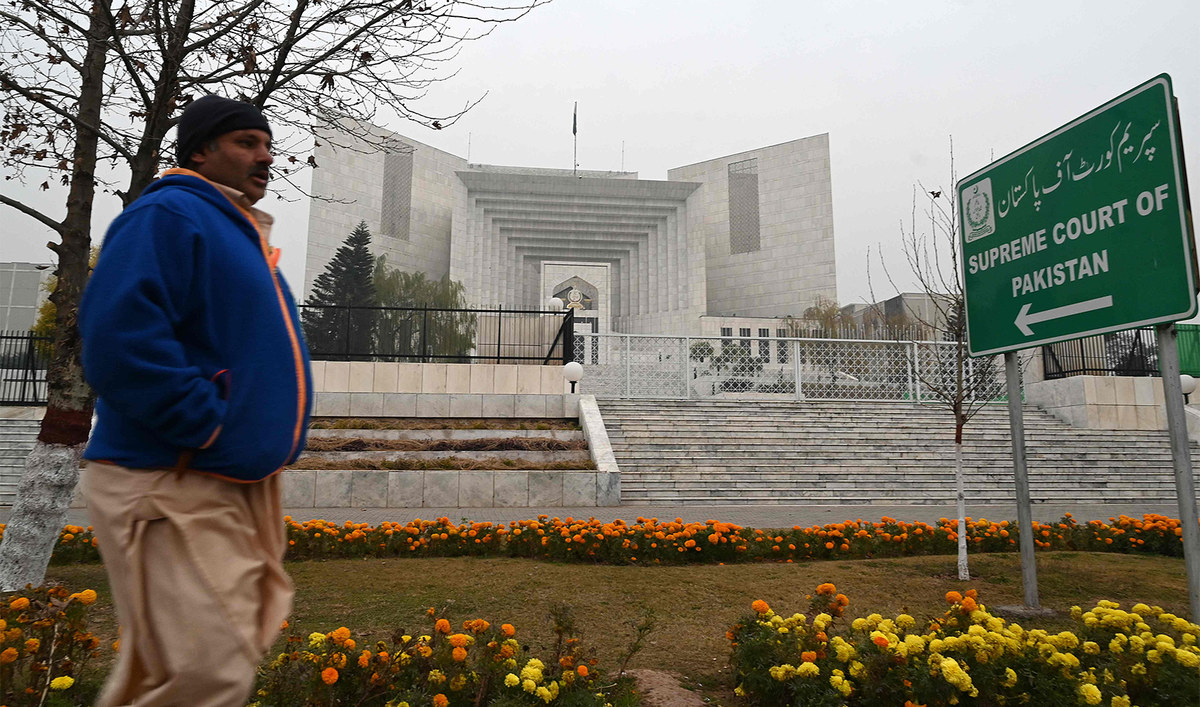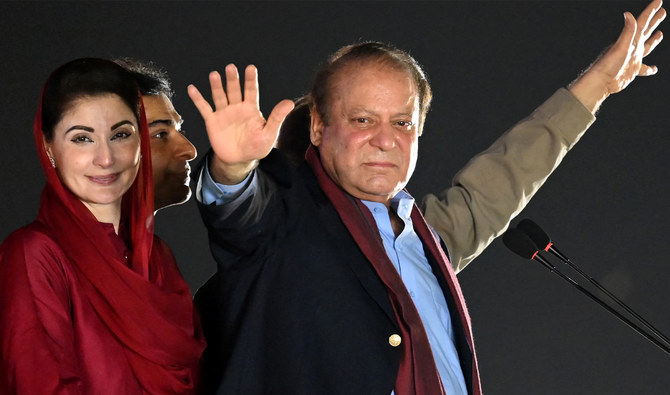ISLAMABAD: As Pakistan gears up for general elections next month, the superior judiciary’s role in political affairs has come under the spotlight, with both political leaders and legal experts criticizing top judges for taking a “partisan” approach in arbitrating political disputes both in the past and the present.
The Supreme Court is a key power holder in Pakistan, with a history of adjudicating election disputes, interpreting constitutional provisions related to elections, and disqualifying politicians, including prime ministers, from holding public office.
The judiciary’s imprints on politics and policymaking are wide, with top judges known to challenge, limit and collaborate with both elected and unelected centers of power and political and military leaders widely seen as co-opting and even controlling judges to align the judiciary’s interests with their own. In Pakistani politics, there is a “troika” of power between the prime minister, the army chief and the chief justice, with shifting alignments and conflicts between the three officeholders often determining the very contours of national politics.
“The worldwide phenomenon known as the judicialization of politics extends beyond political realms and notably, in Pakistan, this trend gained prominence, particularly since 2009,” legal expert Usama Khawar told Arab News.
“The judiciary’s role in pivotal decisions, such as determining eligibility for elections, has significantly increased. Many issues that would traditionally be political disputes resolved in the political arena, streets, or at the ballot box are now being adjudicated in courts.”

A man walks past the Pakistan's Supreme Court building in Islamabad, Pakistan, on January 12, 2024. (AFP)
Indeed, the Supreme Court’s political record is almost as old as Pakistan itself, born in 1947 after the end of British rule over united India.
The court famously created “the doctrine of necessity” in 1954 to justify Pakistan’s first application of martial law, after which it used the principle to legalize each one of the country’s three military coups in 1958, 1977 and 1999. The judiciary has also been seen as playing handmaiden to military rulers in other ways, most famously by hanging Zulfikar Ali Bhutto, a former prime minister, in 1979 in what is still considered one of the most controversial legal judgments in Pakistani history.
In June 2012, the Supreme Court convicted and disqualified Prime Minister Yousaf Raza Gilani of the Pakistan People’s Party for contempt. In July 2017 the top court invoked corruption charges to remove three-time Prime Minister Nawaz Sharif from office, and later also disqualified him from heading his Pakistan Muslim League-Nawaz (PML-N) party ahead of July 2018 elections.
As Pakistan approaches polls on Feb. 8, the judiciary is once again in the eye of the political storm.
Last week, the Supreme Court ruled in favor of the Election Commission’s (ECP) decision to strip the country’s most popular political party, the Pakistan Tehreek-e-Insaf (PTI), of its election symbol, the cricket bat. The verdict has been widely criticized by supporters of jailed PTI founder and ex-PM Imran Khan as well as independent analysts, who say the top court is toeing the line of the powerful military establishment which is accused of trying to sideline Khan and his party from the polls. The army says it does not interfere in political affairs.
In the same breath, the Supreme Court recently also overturned a law that barred politicians with past convictions from seeking political office, a move that has paved the way for Sharif to run in the upcoming parliamentary elections. Khan’s main rival, Sharif has been cleared of most court cases as well as a lifetime ban to contest polls, and analysts say he appears to be the front runner for the February polls and has the military’s support — an advantage in a country where army generals have had an outsized role in the making and breaking of governments. The army says it is apolitical.
“The judiciary’s recent role is not fair,” PTI spokesperson Shoaib Shaheen told Arab News, commenting on the SC verdict on the party symbol as well as legal cases against Khan. “When the judiciary fails to meet expectations and remains partisan, anger arises, undermining the rule of law.”
A party’s electoral symbol on ballot papers is significant for voters to be able to identify its candidates in the South Asian nation of 241 million people, where a large number of constituencies are in rural areas with low literacy. Stripped of the bat, PTI candidates will need to contest on individual symbols, which could confuse its voters, the party fears, as it already faces an unprecedented crackdown on political activities.
“POLITICALLY MOTIVATED”
The PTI’s issues with the judiciary stem from dozens of cases filed against Khan since he was ousted from office in a parliamentary no-trust vote in April 2022 that he says was orchestrated by the military and his political rivals at the behest of the United States. All three deny the charge. Khan was convicted last August in one case involving the sale of state gifts while he was PM, for which he is serving a three-year sentence. He also faces a slew of other charges ranging from attempted murder to treason and corruption and terrorism.
The party has faced a widening crackdown since May 9 last year, when Khan’s supporters damaged government and military properties in nationwide street protests that the former PM and top leaders of his party are accused of masterminding. Thousands of Khan’s followers were arrested after the protests and dozens of members of his party, including some of his closest and oldest aides, deserted him. Khan’s party, already at odds with powerful army generals by the end of his tenure as PM, has since May been grappling with what independent analysts have called a military-backed crackdown that has gathered pace ahead of the Feb. 8 vote. The army and the government say they are only prosecuting PTI leaders and supporters who were involved in the May 9 violence, particularly the destruction of army properties.
The PTI alleges the military is attempting to keep it out of the election race, a charge the army denies, and candidates from his party complain of being denied a level playing field and the right to freely campaign. His party members have accused state authorities of intimidation, harassment and unwarranted arrests and said the judiciary has looked the other way.
Referring to the crackdown and Khan’s imprisonment, Shaheen called for a “proactive judiciary” that intervened when human rights and the law were being violated. In the past the PTI itself invited courts to review the judgment on the no-confidence vote, proceed on corruption charges against rival politicians, challenge the electoral commission, facilitate new elections, investigate Khan’s allegations of a foreign conspiracy to oust him, and ensure Khan’s paty could hold protests and sit-ins in the capital city unencumbered.
“The wrongful imprisonment of Imran Khan underscores concerns about compromised judges and discriminatory decisions, affecting the overall fairness of the judiciary,” the PTI spokesperson added.

Former Pakistani Prime Minister Imran Khan pauses as he speaks with Reuters during an interview, in Lahore, Pakistan on March 17, 2023. (REUTERS/File)
Even the PTI’s main rival party, the PMLN, admitted to the judiciary’s “politically motivated” verdicts.
“At times, the judiciary has rewritten the constitution through its decisions, a power reserved for parliament,” Mohsin Shahnawaz Ranjha, a member of the PML-N legal team, told Arab News.
“[Nawaz] Sharif’s -2017] disqualification [from office], conviction in politically motivated cases without following legally admissible evidence showed the judiciary was not acting as per law,” Ranjha added.
The judiciary’s role in the run up of the 2018 elections was also “questionable,” legal expert Khawar said.
“There were widespread allegations of the judiciary’s partisanship and witch-hunting of one political party [PML-N] before and after the 2018 election,” Khawar told Arab News, saying Sharif, a thrice-elected premier, was ousted on “flimsy charges” while an implementation bench of the apex court was formed to ensure he was convicted.
“Now in 2024, the PTI and Khan are also leveling serious allegations against the [military] establishment and accusing the judiciary of facilitating the PTI’s persecution,” Khawar added.

Pakistan's former Prime Minister Nawaz Sharif (R) stands beside his daughter Maryam Nawaz (L) as he waves to their supporters along with his brother and former Prime Minister Shehbaz Sharif (back) gathered at a park during an event held to welcome him in Lahore on October 21, 2023. (AFP/File)
“PRIMARY HOPE”
But there are many who commend the senior judiciary for its role in ensuring the latest general election, delayed since November, would be held in February.
After months of uncertainty over the election date, the Election Commission said in November it would hold general polls on Feb. 8 after a consultation with President Arif Alvi that was ordered by the Supreme Court in fulfillment of a constitutional requirement. On Dec. 15, the ECP issued the full schedule for general elections, again after the top court ordered the regulator to issue the plan the same day.
“Recently, the Supreme Court has taken proactive steps by ordering timely elections, ensuring adherence to constitutional timelines,” legal expert Barrister Shabbir Shah, who is affiliated with the Pakistan Peoples Party (PPP), one of the country’s main political parties, told Arab News.
“Currently, our judiciary remains the primary hope for ensuring elections take place.”
But legal experts like Khawar warn that the top court’s interference in political matters threatens the credibility of the higher judiciary and leads to in-fighting.
“Political disputes are routinely brought to courts, either proactively by superior courts or compelled by competing political parties and this heightened involvement has led to the polarization of the judiciary, as political disputes inherently foster division,” he said. “In the long run, this jeopardizes the judiciary’s credibility and erodes public confidence in it as a neutral and impartial institution.”
The effectiveness of the judiciary’s decisions hinged on its credibility and moral authority while accusations of collaboration between senior judges and non-elected power entities ultimately undermined the judiciary’s credibility and independence, Khawar added:
“A widespread perception among the people that the judiciary is partisan harms its credibility, independence, and public trust in the system. Therefore, the judiciary should strive to act impartially, avoiding the appearance of supporting one party over another, especially in political disputes.”



















